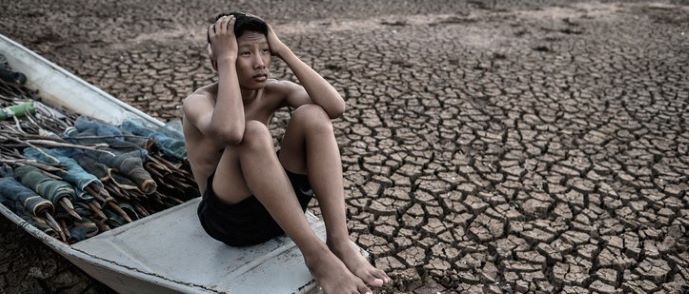Climate change and its impact on displaced people
As research expands beyond natural sciences, academic library collections must shift to support emerging areas that explore and document the human aspect of climate change

By Jodi Johnson, Product Marketing Manager
July 2023 marked a historic moment in our planet's climate history as it became the hottest month on record, beginning what United Nations Secretary-General Antonio Guterres referred to as an era of "global boiling." In the face of this crisis, scientific research has emerged as a pillar in providing the knowledge and evidence needed to confront climate change effectively. Last year, Institute for Scientific Information (ISI)TM, part of ClarivateTM, released a report that sheds light on the current landscape of climate change research. This report underscores the significance of understanding climate migration, which is a multifaceted challenge arising from the interplay of environmental and social factors.
The ISI report highlights that climate change research over the last 20 years has predominantly revolved around natural science disciplines. While this research is essential in understanding the physical aspects of climate change, the report points out that the emergence of new research topics reflects a growing awareness of social responsibility in climate change research. Such emerging topics include Agricultural Policy, Crop Science as well as Political Science subfields like Climate Policy and Governance and Environmental Diplomacy and Climate Politics.
As research shifts and expands into new areas, academic libraries are challenged to sync their collections to the needs of researchers and students exploring the societal implications of climate change, including its effects on human displacement, agriculture, food security and governance. In response, ProQuest, part of Clarivate, is assembling databases and curated ebook collections that make it easy for academic librarians to support the varying needs of their researchers and students.
These content sets also support research into one of the most concerning aspects of climate change’s impact on human populations: the disproportionate burden borne by migrants, asylum seekers and those who have already been displaced due to various reasons, including environmental factors. According to Ingrid Boas, author of Climate Migration and Security: Securitisation As a Strategy in Climate Change Politics, climate change exacerbates the existing challenges of these communities, making it more difficult to access resources, find suitable living conditions and secure livelihoods.
Supporting the study of geopolitical implications and security concerns
The United Nations has included Climate Action among its Strategic Development Goals for “Building the future we want,” noting that Earth stands at the “brink of climate catastrophe.” Climate migration, driven by rising sea levels, prolonged droughts and extreme weather events, is among the complex issues that require immediate study. Emerging research in fields such as Agricultural Policy and Crop Science is crucial for improving food security, trade, food systems, and global human welfare. As communities face environmental pressures that threaten their homes, access to food and livelihoods, they are compelled to seek refuge in safer regions, often crossing borders in the process. This mass movement of people strains resources and creates social tensions in both host and origin regions.
Access to scholarly content that helps researchers explore the dynamics of climate migration accelerates the development of effective strategies that address this human aspect of climate change. Cross-disciplinary collections enable researchers to study the intersection between climate change, agriculture and migration to gain valuable insights into potential mitigation and adaptation measures. Research that leads to supportive policies and practices can help climate migrants build resilience and find stability in their new communities.
A growing need to support political scientists
In developing collections, academic librarians should also consider the needs of political scientists specializing in new climate-related subfields, like Environmental Ethics and Political Theory, Climate Policy and Governance and Environmental Policy and Politics.
Research in these areas plays a pivotal role in understanding how climate migration impacts international relations, governance structures and human rights. The displacement of people across borders due to climate-induced environmental changes raises complex legal and ethical questions that demand careful examination. In her book Environmental Justice for Climate Refugees, author Francesca Rosignoli notes the need for policies that consider the rights and dignity of climate migrants as the backbone of fair and humane responses to their predicament.
Comprehensive approaches and seeking sustainable solutions
The ISI report emphasizes the need for global collaboration to effectively tackle climate change. This crisis knows no borders and requires concerted efforts on a global scale. While climate change research has primarily been conducted at the national level, there is an encouraging trend of increasing international collaboration. Working together, countries, governments and academic institutions can unite diverse expertise and resources to confront climate change collectively.
The critical role of academic libraries
Libraries can have a central role in contributing to deeper understanding of how environmental shifts affect humans and pinpointing those who are most vulnerable. By opening pathways to insightful content, libraries can inspire attention to the issue and action among faculty and students. Importantly, libraries can be the ignition for further research and knowledge-sharing among scholars with a goal of creating more comprehensive strategies to address climate change's influence on at-risk communities.
Is your sustainability and migration collection comprehensive?
ProQuest, part of Clarivate, has a rich collection of sustainability and migration resources to support research, teaching and learning, including the Global Issues Library, the Sustainability Ebook Subscription, the Migration Studies Title-by-title Ebook Collection, the SciTech Premium Collection and the Social Science Premium Collection. Let ProQuest help you build collections with impact.
Explore our resource guide.

Jodi Johnson
Product Marketing Manager for History and Social Change, Social Science and Performing Arts portfolios. With a profound appreciation for history and a background steeped in the arts, she fuses creativity and scholarly insight to offer compelling narratives and to delve into the historical significance behind them.
Recent Blogs
Academic AI’s capabilities are harnessed in ProQuest Research Assistant to create a trusted, powerful research companion
Animal Allies LibList examines animals’ significance in our lives
Tapping a book’s network of citations helps librarians identify key influencers in a sea of titles







